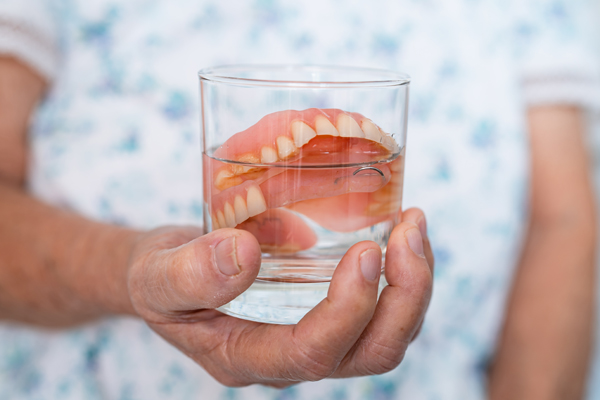4 Tips for Cleaning Implant Supported Dentures

There are numerous benefits of implant supported dentures, and these are a great way to replace missing teeth. Dentures can stay in good shape for many years if taken care of properly. This includes regular at-home cleaning and professional care at certain increments recommended by the dentist.
Benefits of implant supported dentures
The use of dentures is one way people replace some, or an entire mouthful, of their missing teeth. However, traditional dentures rest on the gums, which require some type of adhesive. It also eventually leads to the loss of bone in the upper and lower jaws. The use of implants to support dentures has numerous benefits:
- Better stability, especially in the lower jaw
- Better muscle structure in the face
- Reduced bone loss and bone growth stimulation
- More natural look than regular dentures
- Better ability to chew
- Lack of sore spots typically found with traditional dentures
Denture wearers also have enhanced self-confidence because of the comfort and look of the implant supported type. They no longer hesitate to smile.
Cleaning tips
To prevent infection and decay in natural teeth, dental professionals recommend regular brushing and flossing, and proper cleaning is just as important for those with implant supported dentures. There are numerous attachments and areas to clean so it often takes more work than cleaning natural teeth.
1. Clean dentures daily
It is important to use a soft brush and fluoride toothpaste to clean the dentures on a daily basis. This includes cleaning not only the dentures thoroughly but also the implant attachments. Brushing removes any food particles, as well as plaque, and it helps prevent staining.
Dentists recommend taking the dentures out at bedtime, and this is meant to prevent infection. During this time the dentures should be placed in plain water or a cleanser soaking solution designed specifically for dentures. If using water, make sure it is not hot since this can cause warping of the dentures.
2. Take care of the mouth
After taking dentures out at night, and before reinserting the dentures in the morning, brush the mouth thoroughly. Make sure to clean the tongue, gums and palate. This removes plaque from the soft tissues and stimulates circulation.
3. Use mouthwash
Along with brushing, rinsing with mouthwash should be done a couple of times a day. This is an additional step to fight the buildup of bacteria and plaque since both of these can damage the implant supported dentures and gums.
4. See the dentist regularly
Denture wearers should schedule appointments with the dentist a couple of times a year. During a checkup, the dentist will examine the mouth and ensure the dentures are still fitting properly. Once a year, or every couple of years, X-rays may be taken to see the implants and make sure everything is normal.
It is also important to see the dentist if the dentures crack, break or loosen. A dental professional can make the appropriate adjustments so they do not suffer permanent damage.
Conclusion
Many people choose implant supported dentures to replace missing teeth and improve their smile. Cleaning them properly will help extend their quality and wear.
Are you considering implant supported dentures in the Tyler area? Get more information at https://www.timsmithdental.com.
Check out what others are saying about our dental services on Yelp: Implant Supported Dentures in Tyler, TX.
Recent Posts
Considering implant supported dentures? These prosthetics are one of the most common tooth replacement options as they offer a hybrid approach, combining dentures with dental implants. Keep reading to find out more! Outlined below are a few commonly asked questions and answers about implant supported dentures. It can be helpful to review these when looking into…
General dentists are the best resource to refer to when it comes to plaque and tartar. They specialize in treating both, while also making an effort to educate patients on ways to prevent development to begin with. Thankfully, there are a lot of ways that general dentists can help patients avoid this from occurring. One…
It is not just inconvenient and humiliating to have loose dentures. They may even end up posing a risk to your dental health over time. Unfortunately for denture users, looseness is a common long-term side effect of this sort of dental care. There are several solutions available when it comes to repairing a loose denture,…
If your dentist has diagnosed you with gum disease, you should start making improvements to your oral hygiene right away. The faster you catch this condition, the more likely you are to overcome it. People who ignore the disease can find themselves with various oral health issues, including tooth loss. Eventually, the condition can affect…


